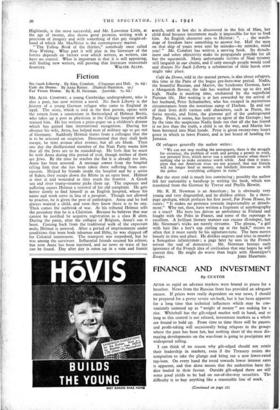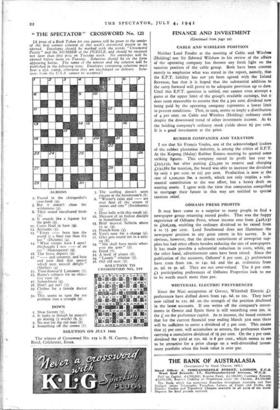FINANCE AND INVESTMENT
By CUSTOS
AFTER so rapid an advance markets were bound to pause for a breather. News from the Russian front has provided an adequate excuse. If prices were really dependent on war news, I should be prepared for a pretty severe set-back, but it has been apparent for a long time that technical influences which may be con- veniently summed up as "weight of money" are making for a rise. Whitehall has the gilt-edged market well in hand, and so long as this control is not relaxed, investment markets as a whole are bound to hold up. From time to time there will be pauses, and profit-taking will occasionally bring relapses in the groups where the pace has been hot, but nothing short of the most dis- maying developments on the war-front is going to precipitate any widespread selling.
I can think of no reason why gilt-edged should not retain their leadership in markets, even if the Treasury resists the temptation to take the plunge . and bring out a new lower-rated tap-loan. On every hand the trend towards lower interest rates is apparent, and that alone means that the authorities have the dice loaded in their favour. Outside gilt-edged there are still some good yields to be had on out-of-the-way securities. The difficulty is to buy anything like a reasonable line of stock.
(Continued on page 22)
FINANCE AND INVESTMENT
(Continued from page 20)
CABLE AND WIRELESS POSITION
Neither Lord Pender at the meeting of Cable and Wireless (Holding) nor Sir Edward Wilshaw in his review of the affairs of the operating company has thrown any fresh light on the taxation position of the cable group. Both have been content merely to emphasise what was stated in the report, namely, that the E.P.T. liability has not yet been agreed with the Inland Revenue, but that it is hoped that the substantial addition to the carry forward will prove to be adequate provision up to date. Until this E.P.T. question is settled, one cannot even attempt a guess at the upper limit of the group's available earnings, but it does seem reasonable to assume that the 4 per cent. dividend now being paid by the operating company represents a lower limit in present conditions. That, in turn, seems to imply a distribution of 4 per cent. on Cable and Wireless (Holding) ordinary stock despite the downward trend of other investment income. At 6x the holding company's ordinary stock yields about 61 per cent. It is a good investment at the price.
RUBBER COMPANIES AND TAXATION I see that Sir Francis Voules, one of the acknowledged leaders of the rubber plantation industry, is among the critics of E.P.T. At the Kepong (Malay) Rubber Estates meeting he quoted some striking figures. This company raised its profit last year to £253,152, but after putting £25,500 to reserve and charging £130,881 for taxation, the board was able to increase the dividend by only a per cent. to 122 per cent. Production is now at the rate of x,xoo,000 lbs. a month, which not only implies a sub- stantial contribution to the war effort, but a heavy draft on wasting assets. I agree with the view that companies compelled to mortgage their future in this way are entitled to special taxation relief.
ODHAMS PRESS PROFITS
It may have come as a surprise to many people to find a newspaper group returning record profits. That was the happy experience of Odhams Press, whose income rose from £428,137 to L606,229, enabling the ordinary dividend to be raised from 6 to 74 per cent. Lord Southwood does not illuminate the newspaper position to any great extent in his survey. It is obvious, however, that the drastic curtailment of newsprint sup- plies has had other effects besides reducing the size of newspapers. It has made possible a substantial reduction in costs, while, on the other hand, advertisement rates have been raised. Since the publication of the accounts, Odhams' 6 per cent. £a preferences have risen from los. to 14s. 6d. and the 4s. ordinaries from 2S. 9d. to 3s. 9d. They are not over-valued. The 8 per cent. £a participating preferences of Odhams Properties look to me to be worth much more than par.
WHITEHALL ELECTRIC PREFERENCES
Since the Nazi occupation of Greece, Whitehall Electric La preferences have drifted down from 14s. 6d. to los. They have now rallied to I2S. 6d. on the strength of the position disclosed in the latest accounts. If one writes off the company's invest- ments in Greece and Spain there is still something over 2os. in the £ on the preference capital. As to income, the board estimate that for the current financial year ending March 31st next there will be sufficient to cover a dividend of 5 per cent. This means that 24 per cent. will accumulate as arrears, the.prefer.ence shares carrying a cumulative dividend of 74 per cent. On the 5 per cent. dividend the yield at 12s. 6d. is 8 per cent., which seems to me to be attractive for a prior charge on a well-diversified invest- ment portfolio when the book value is over par.































 Previous page
Previous page